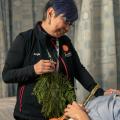Nuclear medicine
Information on what to expect if you are scheduled for a nuclear test or scan at St. Paul's Hospital.
Overview
Nuclear medicine imaging is a method of producing images by detecting radiation from different parts of the body. These images are taken after a radioactive tracer is given to the patient. The tracer is given by injection, by inhalation, or by swallowing a pill or a drink.
Your doctor will refer you for a nuclear medicine test or scan if they want to know how a certain organ is working. These tests show how the organs are working, not just how they look. Common nuclear medicine tests at St. Paul’s Hospital include:
- Bone scan
- Heart scan
- Lung scan
- Kidney scans
Providence Health Care specializes in thyroid uptake tests and thyroid scans. These scans show thyroid gland activity and help diagnose hyperthyroidism or hypothyroidism.
Preparing for the test
To get the most out of your appointment and to have a smooth experience, here’s some tips for planning your visit.
- Our staff will speak with you in English. If you are not fluent in English, please bring an adult interpreter with you who is able stay for the entire test.
- If you do not speak English and need an interpreter (at no cost to you), please let us know in advance.
- If you need a sign language interpreter (at no cost to you), please let us know in advance.
- If you are not able to keep your appointment, please call the department right away. By giving us at least 24 hours notice we are able to use your time slot for another patient. We will try to give you another date and time for your test when you call.
- Please do not wear scented products. All Providence Health Care hospitals and residences are scent-free environments.
- Review any handouts you received for your specific test so that you can prepare. Some tests have no advance prep, others have extensive requirements.
- Tests and scans vary in length from less than one hour to more than six hours. Most tests have two parts: the administration of the tracer and then the test or scan itself. Nuclear medicine staff will tell you how long you will be at the hospital when they book your appointment.
- Approximate timing for some of the most common scans
- Bone scan: total time of nearly six hours, including a 3-4 hour wait between initial injection and scan.
- Heart scan: several tests within a six-hour window.
- Lung scan: approximately one hour.
- Kidney scans: timing depends on scan you are receiving.
- Please arrive early to give yourself time to check in. Please bring your BC Services Card with you.
- If you are pregnant or breast/chest feeding, please tell the technologist when you arrive.
- Do not bring children under the age of 12 with you unless you bring someone to care for them while you are having the test.
During the test
When you arrive for your test, one of the technologists will give you a radioactive tracer. Often, they will inject the tracer into a vein. Some tracers are inhaled, and others are pills that you swallow. This tracer is absorbed by your body and will allow the camera to “see” inside your body.
You may need to wait for your body to absorb the tracer before the technologist can perform the scan. This depends on the tracer and the type of scan you are receiving.
You will lie on a padded examination table under a gamma camera. You will be positioned under the camera while it takes a series of pictures. Because the pictures are taken at a constant rate, you must lie still.
The average imaging time is about one hour. Some scans need more than one hour and, in some cases, more than one visit.
There are a series of crystals inside the head of the camera. They detect radiation coming from the body organ being examined and form a series of images.
At St. Paul’s Hospital, we use SPECT (single-photon emission computed tomography) technology for many of our nuclear medicine tests. This type of scan uses a special camera to create 3D pictures. These pictures let your doctor analyze your body's organs, tissue and bones.
After the test
In most cases, you will experience no side effects from the test, and you will be able to go home right away. If the medication you took for your scan has side effects, we will keep you in the clinic until the effects have cleared.
A nuclear medicine specialist will look at your test or scan results. A report is sent to your referring physician within a week.
Support for Indigenous Peoples
The Indigenous Wellness Liaison Team is here to support your health journey. Team members offer cultural support and healthcare advocacy. Learn more below or call them at 604-682-2344,62937 or email IWL@providencehealth.bc.ca.
Education & resources
Location
Nuclear Medicine
St. Paul's Hospital
Level 2, Providence
1081 Burrard Street
Vancouver, BC, V6Z 1Y6
Medical & professional referrals
To refer a patient for a nuclear medicine scan, please complete our referral form. You can fax it to the number below.
